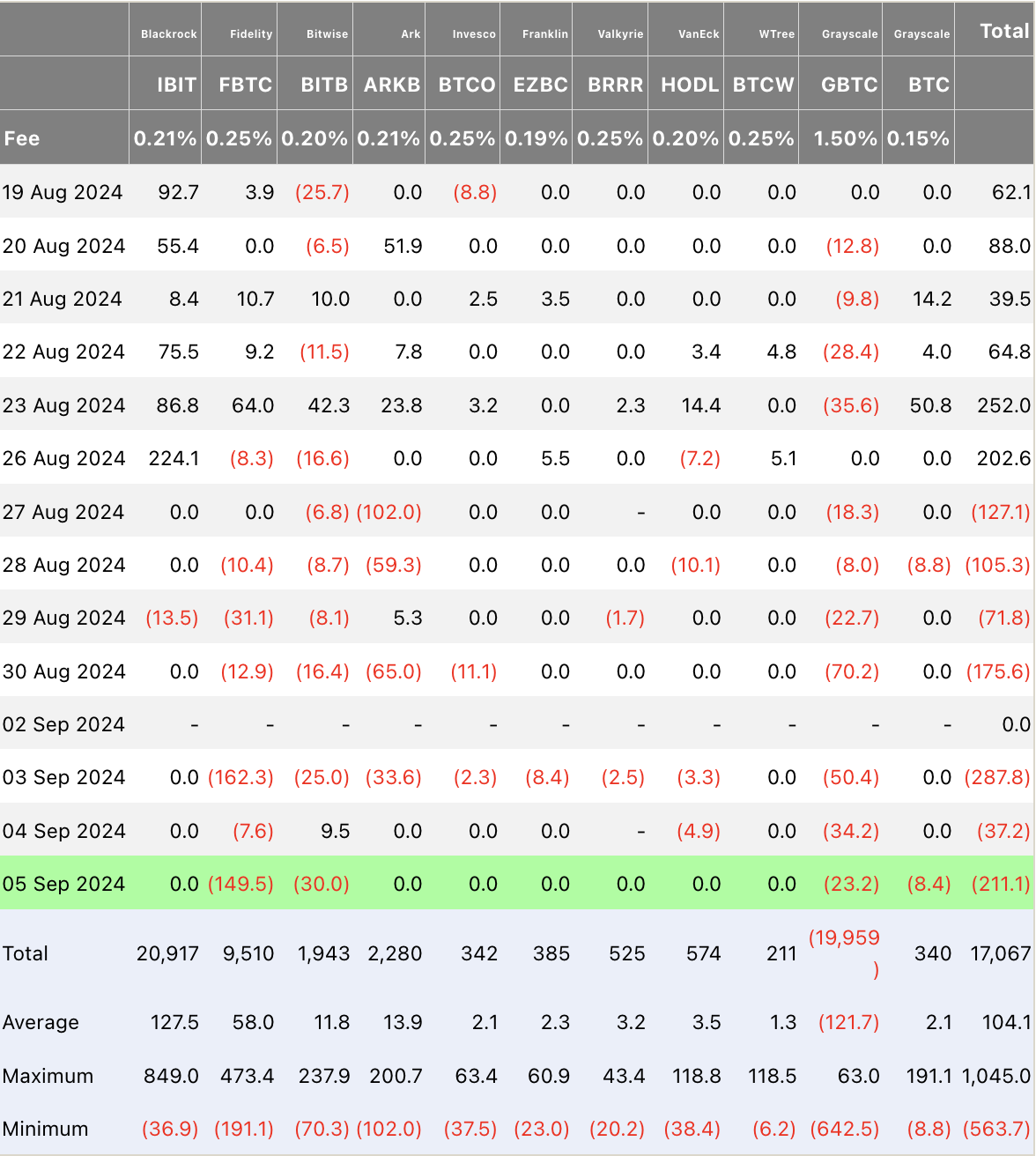U.S. Bitcoin ETFs Continue Outflows, Losing $211 Million
06.09.2024 13:30 1 min. read Alexander Stefanov
On Thursday, U.S. spot Bitcoin ETFs saw significant withdrawals, totaling $211.15 million, marking a week-long trend of outflows.
Fidelity’s FBTC led with $149.49 million in withdrawals, followed by Bitwise’s BITB, which lost $30 million. Grayscale’s GBTC and mini trust also saw declines of $23.22 million and $8.45 million, respectively.
No funds saw gains, while others, including BlackRock’s IBIT, recorded no activity. Trading volumes across 12 ETFs dropped to $1.35 billion, continuing the downward trend.
In the Ethereum ETF space, movements were minimal with $152,720 in outflows. Grayscale’s ETHE lost $7.39 million, but its Ethereum Mini Trust gained $7.24 million.
Other Ethereum ETFs showed no change, and trading volumes decreased to $108.59 million. Since launching, these Ethereum funds have experienced $562.31 million in outflows.
As markets await U.S. non-farm payroll data, experts suggest that a moderately weak report could ease concerns about economic growth and benefit both stocks and Bitcoin.
-
1
Elon Musk Unveils His Own ‘America Party,’ Signals Pro-Bitcoin Political Shift
07.07.2025 11:40 2 min. read -
2
Bitcoin Blasts Past $121,000 as Institutions Fuel Rally—Will Altcoins Follow?
14.07.2025 8:15 2 min. read -
3
Bitcoin: What to Expect After Hitting a New All-time High
10.07.2025 14:00 2 min. read -
4
Peter Brandt Issues Cautious Bitcoin Warning Despite Bullish Positioning
10.07.2025 20:00 2 min. read -
5
Vanguard Now Owns 8% of Michael Saylor’s Strategy, Despite Calling BTC ‘Worthless’
15.07.2025 17:09 2 min. read
Global Money Flow Rising: Bitcoin Price Mirrors Every Move
Bitcoin is once again mirroring global liquidity trends—and that could have major implications in the days ahead.
What is The Market Mood Right Now? A Look at Crypto Sentiment And Signals
The crypto market is showing signs of cautious optimism. While prices remain elevated, sentiment indicators and trading activity suggest investors are stepping back to reassess risks rather than diving in further.
What Price Bitcoin Could Reach If ETF Demand Grows, According to Citi
Citigroup analysts say the key to Bitcoin’s future isn’t mining cycles or halving math—it’s ETF inflows.
Is Bitcoin’s Summer Slowdown a Buying Opportunity?
Bitcoin may be entering a typical summer correction phase, according to a July 25 report by crypto financial services firm Matrixport.
-
1
Elon Musk Unveils His Own ‘America Party,’ Signals Pro-Bitcoin Political Shift
07.07.2025 11:40 2 min. read -
2
Bitcoin Blasts Past $121,000 as Institutions Fuel Rally—Will Altcoins Follow?
14.07.2025 8:15 2 min. read -
3
Bitcoin: What to Expect After Hitting a New All-time High
10.07.2025 14:00 2 min. read -
4
Peter Brandt Issues Cautious Bitcoin Warning Despite Bullish Positioning
10.07.2025 20:00 2 min. read -
5
Vanguard Now Owns 8% of Michael Saylor’s Strategy, Despite Calling BTC ‘Worthless’
15.07.2025 17:09 2 min. read



